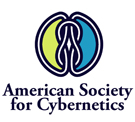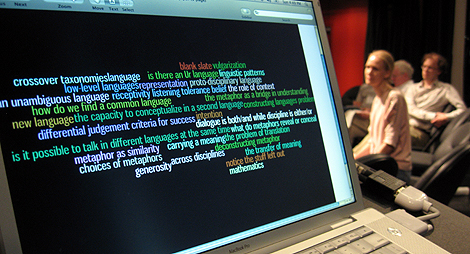Theme 2, Session 1: Questions/Issues
In the morning of August 1st C:ADM2010 continued to address Theme 2 of the conference: Cross-over processes / trans-, inter-, meta: how we might cross-over between fields – metaphor, aesthetics, process? What does it mean, to be a trans-, inter-, or meta-disciplinary subject?. Following a briefing by Albert Müller, the conference community split into self-elected working groups and each developed set of questions and statements addressing the second theme as follows below. Rapporteurs of the groups reported the questions back to the conference community with the facilitation of Candy Herr.
Group A – Reported by Janet Singer
Group B – Reported by Jennifer Kanary Nikolov(a)
We discussed the term aesthetics. How is cybernetics related to aesthetic processes: set of principles We questioned ‘transdisciplinary’ in relation to our own disciplines. How trans are we? What is the distance?
Trans makes the suggestion of a gad that needs to be bridged. Is the bridge is the common interest?
We discuss measuring effect vs affect
We came up with three questions:
Does transdisciplinarity generate new disciplines?
Does the metaphor become a tool to meet between the different disciplines? Meaning where the differences can find common ground, so the metaphor functions as unconventional affective and effective decoder?
Is the power of the metaphor to be a model that encodes and decodes disciplines?
Group C – Reported by Daniel M. Cohen
- Should university be shaped by discipline or function?
- Where do disciplines come from?
- Are disciplines merely correctional?
- Can we construct a discipline that renders other redundant?
- How do we know when disciplines become redundant?
- How do disciplines and communities relate?
- Do disciplines have any independent value?
Group D – Reported by Robert Martin
- Is there any point of collaborating outside the context of a problem?
- What makes a work of art interesting to observe or listen to?
- What kinds of new constraints can be introduced to create “new art”?
- How can art forms of music, dance, art, and poetry be joined together to create new art forms?
- Does true inter-disciplinarity require extensive knowledge of the individual disciplines?
- What about individual vs. collaborative approaches?
- What challenges/problems/issues do group members experience in their creative work? How could this group be helpful?
- What is beauty that we might find it in an algorithm (or in the product of an algorithm)?
- Does doing/making art/research give a better sense of cross-disciplinarity, inter-disciplinarity than methodological discussions around all that?
- How can we use interdisciplinary knowledge and methods to design systems that can judge/evaluate art?
- Can effective collaboration begin outside of personal resonance?
- When do interdisciplinary works require collaborators?
- What social constructs determine if a process is inter, trans, or meta-disciplinary?
Group F – Reported by Claudia Westermann
On Sunday afternoon Group F discussed about discussion, conversation, discourse and identified following questions and statements as important:
- How useful is it to abstract real politics?
- Is it possible to gain insight into political issues without directly being involved in them?
- Thinking and ways of thinking are as concrete as it gets.
Group G – Reported by Stephen Gage
1.0 We discussed the nature and the value of skill
1.1 We took skill to be tacit knowledge, learnt through repeated practise. A figure of 10000 hours was mentioned.
1.2 Many skills are non verbal, and incorporate spatial, mathematical and haptic knowledge
1.3 If I trust your skill then I will not check your procedures. This form of trust saves a huge amount of time in any social exchange, including interdisciplinary exchange.
1.4 There is an aesthetic quality to the sophisticated employment of any skill
1.5 Skill traps people into possibly redundant jobs
1.6 An extension of technology = an amputation of skill
1.7 Can an amputation of skill = (lead to) an extension of technology
1.8 Is the deskilling/exporting of skill from western economies a problem? Is mutualism skewed?
1.9 Are young people/designers growing up without the awareness of the technologies and skills that are fundamental to the lives that they lead?
1.10 Is a move to “trans disciplinary new modes of working” a cover for a nett export of skill
2.0 Skill and inter/trans disciplinary working
2.1 Using the given definitions then skill, based in tacit knowledge, can only be exchanged or pooled in interdisciplinary working
2.2 However, formal exchange of ideas can only take place in the context of trans disciplinary working
2.3 Do we need to consider that 2.1 and 2.2 are complimentary? that conversations must take place in both modes, possibly in oscillation?
3.0 Coupled Systems
3.1 It may be possible to consider that skills linked together as 2.3 are coupled systems
3.2 This leads to a concept of “skill drift” as skills become subtly modified by the exposure to other skills. This could be hugely beneficial.









